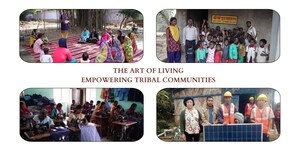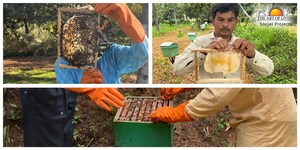BENGALURU, India, April 16, 2024 /PRNewswire/ -- Nestled within the tranquil ambience of The Art of Living International Centre in Bengaluru, a profound agricultural transformation is underway. Inspired by Gurudev Sri Sri Ravi Shankar, this development centres around an innovative farming method that promises to change the game for farmers across the country – multilayer cropping.
Imagine reaping the rewards of five acres of land within the confines of just one acre. This dream has become a reality. Traditional farming practices have been reimagined and redesigned to accommodate multiple crops within a single acre of land, ushering in a new era of agricultural efficiency and productivity.
At the core of multilayer cropping lies a simple yet ingenious concept - utilising space vertically as well as horizontally. Instead of dividing the land into smaller sections for different crops, as is common in mixed cropping; multilayer cropping allows for the simultaneous cultivation of multiple crops in distinct layers.
Picture this: beneath the soil, turmeric (haldi) thrives. While above ground, leafy greens like fenugreek (methi) flourish. Moving upward, at a height of five feet, bitter gourd (karela) vines intertwine, followed by creeping tendrils of ivy gourd (tendli). And crowning this verdant tapestry are fruit bearing papaya trees, soaring to a height of 15 feet. Each crop occupies its own niche, maximising space and minimising interference. Another point to note is that the leafy vegetables will be harvested within 25 to 30 days. This harvesting will provide the aeration that turmeric needs at the growth stage.
But multilayer cropping offers more than just efficient space utilisation. It provides a shield against the harsh elements, with the canopy of taller crops offering shade to those below. This natural protection reduces the impact of intense sunlight, creating a conducive environment for delicate leafy vegetables to thrive even in the harshest climates. It's like having air conditioning for plants, ensuring optimal conditions for growth and development. Methi, particularly valuable during the summer months, commands a premium price. Its peak harvesting season falls in April and May, yet its availability dwindles due to the scorching sun. However, from this one-acre model farm, a methi yield of approximately 1,000 to 1,200 kg can be anticipated. A similar harvest of 1,000 to 1,200 kg of karela is also within reach. The primary emphasis remains on the turmeric harvest.
Moreover, multilayer cropping slashes labour costs by eliminating the need for manual weeding. Traditionally, farmers would sow turmeric and leave the surface bare, only to contend with invasive weeds later on. But in this model, every inch of land is utilised, with leafy greens occupying the surface level, effectively crowding out unwanted vegetation. This not only saves labour costs but also provides an additional source of income through the sale of these leafy vegetables.
Additionally, the investment made in this model farm extends beyond a single year; it is designed to endure for up to five years.
The benefits don't end there. By incorporating natural farming techniques, such as the use of Jeevamrut and Vermicompost; soil health and fertility is ensured without relying on harmful chemicals. Pest control is achieved through innovative means, such as the installation of a green net to intercept airborne insects, reducing pesticide costs by a staggering 80%. In the event that insecticides are still required, Neemastra, Agniastra, and Brahmastra are resorted to. These natural farming techniques are employed to safeguard crops, ensuring not only their protection but also the overall health of the plants.
From a single acre of land, farmers can expect bountiful harvests associated with five acres. With minimal investment and maximum yield, multilayer cropping offers a lifeline to struggling farmers, providing a pathway to prosperity and sustainability.
But this is just the beginning. The Art of Living is continuously innovating - exploring new possibilities for multilayer cropping with six or even seven crops. Through training programmes and educational initiatives, they aim to empower farmers with the knowledge and skills to adopt these transformative practices, ushering in a new era of agricultural abundance.
In a world grappling with food insecurity and environmental degradation, multilayer cropping offers tremendous hope. It's not just about growing crops; it's about cultivating a brighter future for generations to come. And with each harvest, we move one step closer to realising that vision.
About The Art of Living Social Projects
Inspired by the world renowned humanitarian and spiritual leader Gurudev Sri Sri Ravi Shankar, The Art of Living is a global non-profit organisation dedicated to peace, well-being, and humanitarian service. Committed to holistic development, The Art of Living champions various initiatives, including water conservation, sustainable agriculture, afforestation, free education, skill development, women empowerment, integrated village development, renewable energy and waste management. Through these multifaceted efforts, The Art of Living strives to create positive social and environmental impact, fostering a more sustainable and harmonious future for all.
For more updates:
Follow at: https://www.instagram.com/artofliving.sp/
Like at: https://www.facebook.com/artoflivingsocialprojects
Tweet at: https://twitter.com/artofliving_sp
Message at: https://www.linkedin.com/showcase/artofliving-sp
Logo: https://mma.prnewswire.com/media/1979631/4470449/AOLSP_logo_Logo.jp






Share this article